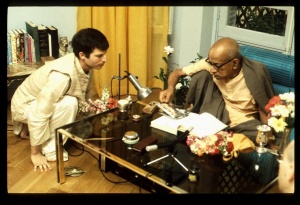SB 10.88.18-19: Difference between revisions
(Vanibot #0018 edit: make synonym terms in Sanskrit italic in SB - Vanisource) |
(Vanibot #0054 edit - transform synonyms into clickable links, which search similar occurrences) |
||
| Line 28: | Line 28: | ||
<div class="synonyms"> | <div class="synonyms"> | ||
''deva'' | ''[//vanipedia.org/wiki/Special:VaniSearch?s=deva&tab=syno_o&ds=1 deva]'' — of the lord; ''[//vanipedia.org/wiki/Special:VaniSearch?s=upalabdhim&tab=syno_o&ds=1 upalabdhim]'' — sight; ''[//vanipedia.org/wiki/Special:VaniSearch?s=aprāpya&tab=syno_o&ds=1 aprāpya]'' — not obtaining; ''[//vanipedia.org/wiki/Special:VaniSearch?s=nirvedāt&tab=syno_o&ds=1 nirvedāt]'' — out of frustration; ''[//vanipedia.org/wiki/Special:VaniSearch?s=saptame&tab=syno_o&ds=1 saptame]'' — on the seventh; ''[//vanipedia.org/wiki/Special:VaniSearch?s=ahani&tab=syno_o&ds=1 ahani]'' — day; ''[//vanipedia.org/wiki/Special:VaniSearch?s=śiraḥ&tab=syno_o&ds=1 śiraḥ]'' — his head; ''[//vanipedia.org/wiki/Special:VaniSearch?s=avṛścat&tab=syno_o&ds=1 avṛścat]'' — was about to cut off; ''[//vanipedia.org/wiki/Special:VaniSearch?s=sudhitinā&tab=syno_o&ds=1 sudhitinā]'' — with a hatchet; ''[//vanipedia.org/wiki/Special:VaniSearch?s=tat&tab=syno_o&ds=1 tat]'' — of that (Kedāranātha); ''[//vanipedia.org/wiki/Special:VaniSearch?s=tīrtha&tab=syno_o&ds=1 tīrtha]'' — in (waters of) the holy place; ''[//vanipedia.org/wiki/Special:VaniSearch?s=klinna&tab=syno_o&ds=1 klinna]'' — having wetted; ''[//vanipedia.org/wiki/Special:VaniSearch?s=mūrdha&tab=syno_o&ds=1 mūrdha]-[//vanipedia.org/wiki/Special:VaniSearch?s=jam&tab=syno_o&ds=1 jam]'' — the hair of his head; ''[//vanipedia.org/wiki/Special:VaniSearch?s=tadā&tab=syno_o&ds=1 tadā]'' — then; ''[//vanipedia.org/wiki/Special:VaniSearch?s=mahā&tab=syno_o&ds=1 mahā]'' — supremely; ''[//vanipedia.org/wiki/Special:VaniSearch?s=kāruṇikaḥ&tab=syno_o&ds=1 kāruṇikaḥ]'' — merciful; ''[//vanipedia.org/wiki/Special:VaniSearch?s=saḥ&tab=syno_o&ds=1 saḥ]'' — he; ''[//vanipedia.org/wiki/Special:VaniSearch?s=dhūrjaṭiḥ&tab=syno_o&ds=1 dhūrjaṭiḥ]'' — Lord Śiva; ''[//vanipedia.org/wiki/Special:VaniSearch?s=yathā&tab=syno_o&ds=1 yathā]'' — just as; ''[//vanipedia.org/wiki/Special:VaniSearch?s=vayam&tab=syno_o&ds=1 vayam]'' — we; ''[//vanipedia.org/wiki/Special:VaniSearch?s=ca&tab=syno_o&ds=1 ca]'' — also; ''[//vanipedia.org/wiki/Special:VaniSearch?s=agniḥ&tab=syno_o&ds=1 agniḥ]'' — the god of fire; ''[//vanipedia.org/wiki/Special:VaniSearch?s=iva&tab=syno_o&ds=1 iva]'' — appearing like; ''[//vanipedia.org/wiki/Special:VaniSearch?s=utthitaḥ&tab=syno_o&ds=1 utthitaḥ]'' — risen; ''[//vanipedia.org/wiki/Special:VaniSearch?s=analāt&tab=syno_o&ds=1 analāt]'' — from the fire; ''[//vanipedia.org/wiki/Special:VaniSearch?s=nigṛhya&tab=syno_o&ds=1 nigṛhya]'' — seizing; ''[//vanipedia.org/wiki/Special:VaniSearch?s=dorbhyām&tab=syno_o&ds=1 dorbhyām]'' — with his arms; ''[//vanipedia.org/wiki/Special:VaniSearch?s=bhujayoḥ&tab=syno_o&ds=1 bhujayoḥ]'' — his (Vṛka's) arms; ''[//vanipedia.org/wiki/Special:VaniSearch?s=nyavārayat&tab=syno_o&ds=1 nyavārayat]'' — he stopped him; ''[//vanipedia.org/wiki/Special:VaniSearch?s=tat&tab=syno_o&ds=1 tat]'' — his (Lord Śiva's); ''[//vanipedia.org/wiki/Special:VaniSearch?s=sparśanāt&tab=syno_o&ds=1 sparśanāt]'' — by the touch; ''[//vanipedia.org/wiki/Special:VaniSearch?s=bhūyaḥ&tab=syno_o&ds=1 bhūyaḥ]'' — again; ''[//vanipedia.org/wiki/Special:VaniSearch?s=upaskṛta&tab=syno_o&ds=1 upaskṛta]'' — well formed; ''[//vanipedia.org/wiki/Special:VaniSearch?s=ākṛtiḥ&tab=syno_o&ds=1 ākṛtiḥ]'' — his body. | ||
</div> | </div> | ||
Latest revision as of 20:12, 17 February 2024

A.C. Bhaktivedanta Swami Prabhupada
Please note: The synonyms, translation and purport of this verse were composed by disciples of Śrīla Prabhupāda
TEXTS 18-19
- devopalabdhim aprāpya
- nirvedāt saptame 'hani
- śiro 'vṛścat sudhitinā
- tat-tīrtha-klinna-mūrdhajam
- tadā mahā-kāruṇiko sa dhūrjaṭir
- yathā vayaṁ cāgnir ivotthito 'nalāt
- nigṛhya dorbhyāṁ bhujayor nyavārayat
- tat-sparśanād bhūya upaskṛtākṛtiḥ
SYNONYMS
deva — of the lord; upalabdhim — sight; aprāpya — not obtaining; nirvedāt — out of frustration; saptame — on the seventh; ahani — day; śiraḥ — his head; avṛścat — was about to cut off; sudhitinā — with a hatchet; tat — of that (Kedāranātha); tīrtha — in (waters of) the holy place; klinna — having wetted; mūrdha-jam — the hair of his head; tadā — then; mahā — supremely; kāruṇikaḥ — merciful; saḥ — he; dhūrjaṭiḥ — Lord Śiva; yathā — just as; vayam — we; ca — also; agniḥ — the god of fire; iva — appearing like; utthitaḥ — risen; analāt — from the fire; nigṛhya — seizing; dorbhyām — with his arms; bhujayoḥ — his (Vṛka's) arms; nyavārayat — he stopped him; tat — his (Lord Śiva's); sparśanāt — by the touch; bhūyaḥ — again; upaskṛta — well formed; ākṛtiḥ — his body.
Translation and purport composed by disciples of Śrīla Prabhupāda
TRANSLATION
Vṛkāsura became frustrated after failing to obtain a vision of the lord. Finally, on the seventh day, after dipping his hair into the holy waters at Kedāranātha and leaving it wet, he took up a hatchet and prepared to cut off his head. But at that very moment the supremely merciful Lord Śiva rose up out of the sacrificial fire, looking like the god of fire himself, and grabbed both arms of the demon to stop him from killing himself, just as we would do. By Lord Śiva's touch, Vṛkāsura once again became whole.